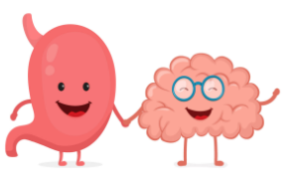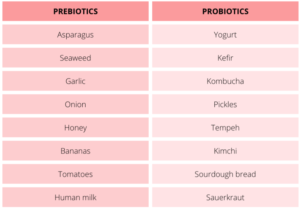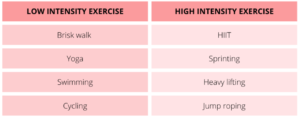
Here’s What You Need to Know About
GUT HEALTH
by Medha Shekhar
Have you ever felt bloated with abdominal pain? Or had trouble sleeping and didn’t know why? Turns out, it might have something to do with your gut health.
As one of the latest trends in the health and wellness community, boosting your gut health has become a popular topic. But as with everything on social media it’s hard to differentiate between what’s true and what’s misinformation. People often believe that they can heal their gut by changing their diet, but it’s important to understand that maintaining a healthy gut is a holistic process that’s different for everybody.
Your gut, also known as your gastrointestinal tract (GIT), is defined as the digestive pathway from your mouth to anus. It is made up of your stomach, small intestine, and colon. It’s responsible for absorbing food and nutrients along with the aid of symbiotic bacteria. Different bacteria affect people in different ways, and when there is an imbalance in the types of bacteria in your body your gut becomes unhealthy. For example, Candida albicans, a fungus that lives harmlessly in your body, helps us digest food and metabolize glucose. However, an imbalance of bacteria in your body can cause an overgrowth of Candida albicans leading to a yeast infection with symptoms such as stomach pain and diarrhea.
Bacteria is often thought of in a negative manner, but in the gut microbiota when you modulate your bacteria, you reap the benefits of a stronger immune system, better digestion, happier mood, and a healthier brain and heart. There are different ways to achieve this ranging from taking probiotics to following a strict sleeping schedule and participating in exercise every day.
Prebiotics & Probiotics Aid Digestion
Prebiotics are compounds in foods that aim to stimulate the activity and growth of already existing “symbiotic” bacteria in the gut microbiota. They are degraded by the gut and further fermented by selective bacteria in the colon. Prebiotics are seen as advantageous because unlike probiotics they do not introduce an exogenous substance in the GIT, they work to enhance the bacteria that already lives in your gut microbiota. However, it is beneficial to understand that probiotics are also a beneficial way of elevating your metabolism and improving your overall digestive system. In the probiotic approach, you ingest bacteria, often through fermented foods, that is able to balance the activity of the gut microbiota, enhancing your health. Prebiotics and probiotics can also work in synergy to activate the bacteria found in the other. Both of these methods focus on helping digestion, supporting your immune system, preventing diarrhea, and decreasing inflammation and allergies. They are found in the following foods:

Stress Has a Negative Effect on Gut Health
Stress is never good for our bodies, especially when it comes to gut health. Stress can affect your digestion, making you more susceptible to bloating, abdomen pain, and a flux in appetite. It also affects not only how quickly the food moves through your digestive tract but also what nutrients your intestines absorb which can negatively lead to constipation or diarrhea. Stress also weakens your intestinal barrier, leading to an imbalance of bacteria in the GIT. Here are some tips on how to manage your stress!

For more information on Stress Management please refer to our webinar: How to Manage your Stress in Uncertain Times Webinar – me&my wellness (meandmywellness.com.au)
Exercise Increases Beneficial Bacteria
Exercise is not only able to help you feel better on the outside, but the inside too. Research studies have been able to prove that when you exercise you increase the number of helpful microorganisms in your gut, enhancing your overall microbiota system and improving the balance and development of bacteria in your GIT. This can lead to the strengthening of your heart and digestive system and an increase in your energy and metabolism. Depending on the level of exercise you participate in, you will find different results in your gut health. Low intensity exercise helps with loosening stool, aiding constipation, and decreasing risk of IBS and colon cancer. High intensity exercise helps increase your metabolism and the essential bacteria in your gut that quickens digestion.

For more information on Exercise please refer to our podcast with Longevity Exercise Physiology: Exercise is Medicine (buzzsprout.com)
Normal Sleep and a Healthy Gut go Hand in Hand
You might already know that getting 8-9 hours of sleep every night can help your mental and physical health, but if you are someone that struggles with falling asleep, it is important to note that it works the other way as well; improving your gut health can improve your sleep schedule. Studies have been able to show that an enhanced ecosystem of the gut microbiota is correlated to a more efficient and longer sleep. It can also lead to an improved immune system and a clearer mind. Because the brain and gut are connected, when you follow an abnormal sleep pattern, your GIT microbiota is negatively affected and you experience symptoms such as inflammation, digestive issues, and headaches.
For more information on Sleep please refer to our webinar: Sleep Mastery – how to get a good night’s sleep! – me&my wellness (meandmywellness.com.au)
Loneliness is Biologically Toxic
Whether you are someone who is always working or someone who keeps to themselves, it is important to make time to make social connections because it turns out loneliness is associated with an unhealthy gut. Research has been able to link loneliness with negative changes in your immune, cardiovascular, and neuroendocrine systems leading to an increase in inflammatory markers associated with your GIT. People who have larger social networks have a healthier ecosystem in their gut microbiotas leading to an increase in their overall health and metabolism. If you are an introvert, don’t fret, creating healthy social relationships can be simpler than you think!

At the end of the day, you need to listen to your body to see what it wants. Your gut health depends on many different factors, but if you are able to improve just one, you will notice easier digestion, less lapses in immunity, less inflammation, and an overall more positive mood.
If you would like further assistance in improving your Gut Health please contact us for a FREE discovery session – CLICK HERE to book!
Resources
Davani-Davari, Dorna, et al. “Prebiotics: Definition, Types, Sources, Mechanisms, and Clinical Applications.” Foods (Basel, Switzerland), vol. 8, no. 3, Mar. 2019, https://doi.org/10.3390/foods8030092.
Frederick Health. “10 Signs of an Unhealthy Gut.” Frederick Health, 29 July 2021, https://www.frederickhealth.org/news/2021/july/10-signs-of-an-unhealthy-gut/.
Han, Mengqi, et al. “The Interplay between Sleep and Gut Microbiota.” Brain Research Bulletin, vol. 180, Mar. 2022, pp. 131–46.
“Health Benefits of Taking Probiotics.” Harvard Health, 13 Apr. 2020, https://www.health.harvard.edu/vitamins-and-supplements/health-benefits-of-taking- probiotics.
“High Intensity Exercise vs Low Intensity Exercise – Which Is Best?” Forth, 16 Aug. 2021, https://www.forthwithlife.co.uk/blog/high-intensity-vs-low-intensity-exercise/.
How to Improve Your Gut Health. https://www.vichealth.vic.gov.au/be-healthy/how-to- improve-your-gut-health. Accessed 27 Mar. 2022.
Kechagia, Maria, et al. “Health Benefits of Probiotics: A Review.” ISRN Nutrition, vol. 2013, Jan. 2013, p. 481651.
Monda, Vincenzo, et al. “Exercise Modifies the Gut Microbiota with Positive Health Effects.” Oxidative Medicine and Cellular Longevity, vol. 2017, Mar. 2017, p. 3831972.
Nguyen, Tanya T., et al. “Association of Loneliness and Wisdom With Gut Microbial Diversity and Composition: An Exploratory Study.” Frontiers in Psychiatry / Frontiers Research Foundation, vol. 12, Mar. 2021, p. 648475.
Saarela, M., et al. “Gut Bacteria and Health Foods–the European Perspective.” International Journal of Food Microbiology, vol. 78, no. 1-2, Sept. 2002, pp. 99–117.
Singh, Arun, et al. “Oral Candidiasis: An Overview.” Journal of Oral and Maxillofacial Pathology: JOMFP, vol. 18, no. Suppl 1, Sept. 2014, pp. S81–85.
Smith, Robert P., et al. “Gut Microbiome Diversity Is Associated with Sleep Physiology in Humans.” PloS One, vol. 14, no. 10, Oct. 2019, p. e0222394.
“Stress Effects on the Body.” American Psychological Association, Nov. 2018, https://www.apa.org/topics/stress/body#:~:text=Stress%20can%20affect%20digestion %20and,bacteria%20to%20enter%20the%20body.
Suryani, Dini, et al. “Type, Intensity, and Duration of Exercise as Regulator of Gut Microbiome Profile.” Current Sports Medicine Reports, vol. 21, no. 3, Mar. 2022, pp. 84–91.
Your Digestive System: 5 Ways to Support Gut Health. https://www.hopkinsmedicine.org/health/wellness-and-prevention/your-digestive- system-5-ways-to-support-gut-health. Accessed 27 Mar. 2022.


